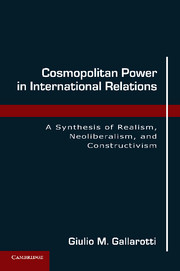 Cosmopolitan Power in International Relations
Cosmopolitan Power in International Relations Book contents
- Frontmatter
- Contents
- Preface
- Introduction
- 1 The Theory of Cosmopolitan Power
- 2 Crucial-Case Textual Analysis of the Founding Fathers of Realism
- 3 Crucial-Case Textual Analysis of the Founding Fathers of Realism
- 4 Case Studies of Soft Empowerment
- 5 Case Study of Hard Disempowerment
- 6 Case Study of Soft Empowerment
- 7 Conclusions
- Appendix Formal Model of Cosmopolitan Power
- References
- Index
6 - Case Study of Soft Empowerment
The Power of Modern American Culture
Published online by Cambridge University Press: 05 June 2012
- Frontmatter
- Contents
- Preface
- Introduction
- 1 The Theory of Cosmopolitan Power
- 2 Crucial-Case Textual Analysis of the Founding Fathers of Realism
- 3 Crucial-Case Textual Analysis of the Founding Fathers of Realism
- 4 Case Studies of Soft Empowerment
- 5 Case Study of Hard Disempowerment
- 6 Case Study of Soft Empowerment
- 7 Conclusions
- Appendix Formal Model of Cosmopolitan Power
- References
- Index
Summary
Soft power traditionally has been seen as manifesting itself largely through culture. In fact, American soft power has, to a large extent, derived from the compelling influence of America's alluring culture. Culture fits the more popular, but limited, vision of soft power. It is soft (does not modify behavior coercively); it is intangible; and it is pervasive and compelling in the world. The power of American culture is more extensive in its manifestations than the soft power analyzed in Chapter 4. These cases chronicled a somewhat more restricted manifestation of soft power in looking at the empowering effects of nations copying the economic policies of other nations. The manifestations of the soft power of culture are broader. They do have elements of emulation, but emulation goes far beyond just copying economic policies. It applies to emulation across issue areas (political, economic, legal, and social) and across actors (within both government and civil society). But the allure of culture and its capacity to enhance national influence are embedded in a much wider appeal than that which is represented by emulation alone. This appeal derives broadly from the endearment a soft power nation can generate, and this endearment manifests itself in pervasive and manifold ways. Also, as seen in the case studies in Chapter 4, the case of the soft empowerment of American culture attests to the workings of a Cosmopolitan process of power. Indeed, the compelling effects of American culture derive to a large extent from America's hard power, principally its economic power. This economic power generates many chariots through which culture itself is disseminated throughout the world. To the extent that these chariots are robust, the allure of American culture becomes that much more compelling. Also consistent with the Cosmopolitan vision of power, the soft power facilitated by the hard power of American primacy serves to enhance American hard power. As with the cases in Chapter 4, a distinct Cosmopolitan cycle of mutual reinforcement appears between hard and soft power in the context of American culture. The allure of American culture has opened up manifold opportunities for the United States to enhance its hard power (economically, militarily, and politically), and this hard power has served to make American culture all the more alluring. The power of American culture today is especially crucial to the influence of the United States, as it has served as an important counterweight to Bush's toxic foreign policy legacy, which has undermined much American soft power in his eight years as president.
- Type
- Chapter
- Information
- Cosmopolitan Power in International RelationsA Synthesis of Realism, Neoliberalism, and Constructivism, pp. 226 - 265Publisher: Cambridge University PressPrint publication year: 2010
